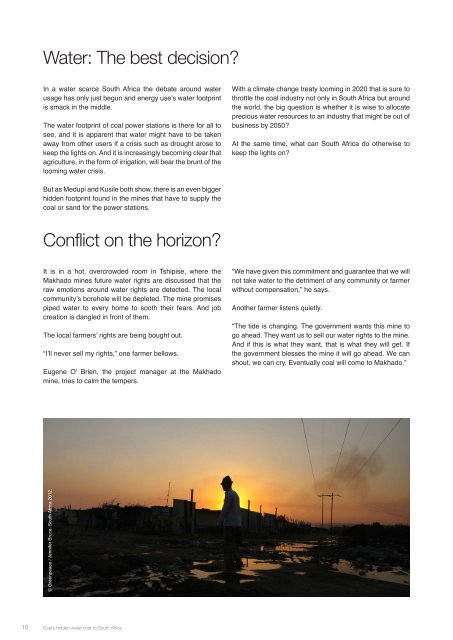Coal's hidden water cost to South Africa - Greenpeace
Coal's hidden water cost to South Africa - Greenpeace
Coal's hidden water cost to South Africa - Greenpeace
You also want an ePaper? Increase the reach of your titles
YUMPU automatically turns print PDFs into web optimized ePapers that Google loves.
Water: The best decision?<br />
In a <strong>water</strong> scarce <strong>South</strong> <strong>Africa</strong> the debate around <strong>water</strong><br />
usage has only just begun and energy use’s <strong>water</strong> footprint<br />
is smack in the middle.<br />
The <strong>water</strong> footprint of coal power stations is there for all <strong>to</strong><br />
see, and it is apparent that <strong>water</strong> might have <strong>to</strong> be taken<br />
away from other users if a crisis such as drought arose <strong>to</strong><br />
keep the lights on. And it is increasingly becoming clear that<br />
agriculture, in the form of irrigation, will bear the brunt of the<br />
looming <strong>water</strong> crisis.<br />
But as Medupi and Kusile both show, there is an even bigger<br />
<strong>hidden</strong> footprint found in the mines that have <strong>to</strong> supply the<br />
coal or sand for the power stations.<br />
Conflict on the horizon?<br />
It is in a hot, overcrowded room in Tshipise, where the<br />
Makhado mines future <strong>water</strong> rights are discussed that the<br />
raw emotions around <strong>water</strong> rights are detected. The local<br />
community’s borehole will be depleted. The mine promises<br />
piped <strong>water</strong> <strong>to</strong> every home <strong>to</strong> sooth their fears. And job<br />
creation is dangled in front of them.<br />
The local farmers’ rights are being bought out.<br />
“I’ll never sell my rights,” one farmer bellows.<br />
Eugene O’ Brien, the project manager at the Makhado<br />
mine, tries <strong>to</strong> calm the tempers.<br />
© <strong>Greenpeace</strong> / Jennifer Bruce. <strong>South</strong> <strong>Africa</strong> 2012.<br />
10 Coal’s <strong>hidden</strong> <strong>water</strong> <strong>cost</strong> <strong>to</strong> <strong>South</strong> <strong>Africa</strong><br />
With a climate change treaty looming in 2020 that is sure <strong>to</strong><br />
throttle the coal industry not only in <strong>South</strong> <strong>Africa</strong> but around<br />
the world, the big question is whether it is wise <strong>to</strong> allocate<br />
precious <strong>water</strong> resources <strong>to</strong> an industry that might be out of<br />
business by 2050?<br />
At the same time, what can <strong>South</strong> <strong>Africa</strong> do otherwise <strong>to</strong><br />
keep the lights on?<br />
“We have given this commitment and guarantee that we will<br />
not take <strong>water</strong> <strong>to</strong> the detriment of any community or farmer<br />
without compensation,” he says.<br />
Another farmer listens quietly.<br />
“The tide is changing. The government wants this mine <strong>to</strong><br />
go ahead. They want us <strong>to</strong> sell our <strong>water</strong> rights <strong>to</strong> the mine.<br />
And if this is what they want, that is what they will get. If<br />
the government blesses the mine it will go ahead. We can<br />
shout, we can cry. Eventually coal will come <strong>to</strong> Makhado.”

















